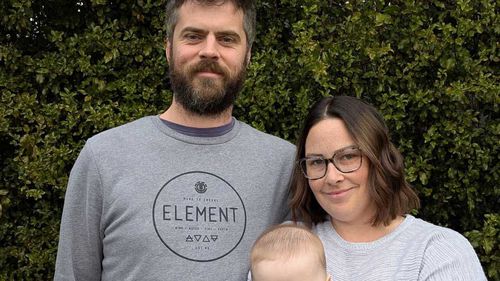It was a cold call that came at a vulnerable time for Adelaide woman Nikola Cowin.
Back in 2014, Cowin was an out-of-work student, studying a science degree at Flinders University.
A recruiter on the other end of the call had the objective of enrolling as many students as possible into the now discredited and defunct tertiary training provider, Franklyn Scholar.

Cowin believes the recruiter obtained her number from one of the popular job websites she was using to apply for work, such as SEEK or CareerOne.
“They were targeting people who were pretty much jobless, which, looking back on it now, is rather dodgy,” Cowin said.
The recruiter offered to sign Cowin up to an online business management course.
“They were saying it would increase my chances of being able to get work by having that knowledge under my belt,” she said.
Cowin claims the recruiter told her the course was free.
“They were saying, ‘It’s government-funded, so there really isn’t anything to lose’,” she said.
Like thousands of other students, Cowin was signed up on the spot during that phone call.
Cowin admitted to feeling a bit skeptical initially, questioning if the course might be a scam. However, her doubts were dispelled when she promptly received her email login details and was connected with a trainer.
“I didn’t have any reason to really question it. I figured, if it was a scam, it was an elaborate scam,” Cowin said.
Cowin spent the next two years completing the course, while also working on her university degree.
It wasn’t until 2019, about five years after she was first signed up to the Franklyn Scholar course, that she got a nasty surprise.
Discussing HECS debts with her best friend prompted Cowin to reveal her outstanding balance from her university course. Her friend’s surprised reaction was, “You’ve only completed a university degree, it shouldn’t be that high.”
Having not yet hit the income level where compulsory payments would kick in, Cowin had never thought too deeply about her study loans.
After contacting her university and the tax office, Cowin was told she had a large debt from Franklyn Scholar, through the VET FEE-HELP (VFH) scheme.
Due to yearly indexation being applied, that debt now amounts to $35,880.
The news left Cowin shocked and confused.
“I was thinking, hang on, I wasn’t meant to be charged for that course. What’s going on here?” she said.
Cowin said she was especially puzzled about how Franklyn Scholar was able to process her debt through the VFH scheme, as she had not signed any forms.
Having previously gone through the process with Flinders University, Cowin said she knew she needed to sign a Commonwealth Assistance Form (CAF) to apply for the loan.
“I never signed anything. If there was a (CAF), it was fabricated,” Cowin said.
“I started investigating Franklyn Scholar a bit more and found out that they no longer existed – that’s when the saga began.”
Franklyn Scholar was deregistered by the Australian Skills Quality Authority in 2017 as part of a broader crackdown by the watchdog on training providers demonstrating inappropriate conduct.
A Deloitte audit, commissioned by the department, found 86 per cent of Franklyn Scholar students had no online activity between July 2015 and May 2016, and many students had been enrolled without their knowledge.
In 2017, the Australian Competition and Consumer Commission (ACCC) took an education broker that recruited some students for Franklyn Scholar, among other tertiary education providers, to court.
The broker, Acquire Learning, was found by the Federal Court to have made unsolicited telephone calls to some job applicants for the purpose of enrolling them on the spot and engaged in “misleading or deceptive conduct”.
In October 2019, the Department of Employment and Workplace Relations agreed to waive the FEE-HELP debts of students of Franklyn Scholar who had not completed their courses.
Crucially, however, the debts would not be wiped for students like Cowin, who finished their course.
Cowin said the decision by the department was unfair and needed to be changed.
“It’s a bit unfair to say that just because I finished it, I don’t deserve a refund when I didn’t know what was going on,” she said.
“If I knew what was happening, or the charges that I was going to incur, I never would have finished it.”
Cowin, with the help of her partner, Smart, has been fighting to get her debt waived for the past six years, first lodging a complaint with the VET Student Loan Ombudsman and then making an application to the Administrative Appeals Tribunal (AAT).
Both attempts were unsuccessful, as was her latest request to the Department of Finance to waive her debt.
In a decision made last month, the Department of Finance upheld Cowin’s debt, dismissing her argument that she never signed any loan documents and was told the course was free.
The department cited findings from the 2016 Deloitte audit of 331 Franklyn Scholar students, which showed CAFs were found for around 95 per cent of cases.
While an education department official had been unable to find Cowin’s CAF, and Franklyn Scholar’s liquidation made it difficult, if not impossible, for her to chase down a copy herself, that did not mean it didn’t exist, the department concluded.
The department noted Cowin should have also received a Commonwealth Assistance Notice at the time, which included the details of her VFH debt, and this would have also made her aware she was signing up to a loan.
However, Cowin said she did not received any such notice, which is typically sent by the education provider, either.
The decision over his partner’s debt had come as a hard blow to both of them, Smart said, adding that it felt like the system had failed, leaving them with a large, unjust debt.
“It’s obviously very frustrating. We’re young parents now. We don’t earn large salaries or anything. We just try and get by,” he said.
“It just doesn’t make sense. Nikola never signed any forms. Why would she sign up for a double diploma at twice the cost of her uni degree?”
Regulations require education providers to keep student records on file for seven years.
Smart said the department ought to have take over Franklyn Scholar’s record-keeping after the college was deregistered.
“Each request is considered on its individual merits. There is no situation which creates an automatic entitlement to a waiver of debt.”
The department could not specifically comment on Cowin’s case due to privacy reasons, the spokesperson said.






